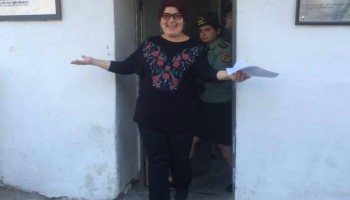Khodorkovsky, 50, was arrested on tax evasion and fraud charges in 2003 along with his business partner Platon Lebedev. The charges were viewed by some observers to be politically motivated, based on Khodorkovky’s support for opposition parties.
The US State Department noted in 2004 that "the apparently selective arrest and detention of prominent businessman Mikhail Khodorkovskiy on the eve of parliamentary elections raised a number of concerns over the arbitrary use of the judicial system."
Khodorkovsky had risen to become the wealthiest man in Russia as the CEO of the Yukos oil company before his initial criminal conviction. Following the trial, the company's value plummeted and it was eventually declared bankrupt.
Khodorkovsky and Lebedev went on trial again in 2010 and were found guilty of embezzlement and stealing oil. Eventually the Moscow City Court reduced the pair's sentences from 13.5 years to 12, but the trial was criticized for the harassment of lawyers and witnesses as well as exclusion of evidence. Amnesty International declared that Khodorkovsky and Lebedev were prisoners of conscience, saying that the verdict "makes it clear that Russia’s lower courts are unable, or unwilling, to deliver justice in their cases."
Amnesty International’s Director for Europe and Central Asia Nicola Duckworth stated then that "the Supreme Court offers the last possible hope for justice." It is that court that has refused to hear his appeal.
Lebedev is scheduled for release in May of 2014 and Khodorkovsky a few months later, in August.
Addressing the court during his 2010 trial, Khodorkovsky declared defiantly, "No person who conflicts with the 'system' has any rights whatsoever. Even when enshrined in law, rights are not protected by the courts."
"I am ashamed for my country," he said.





